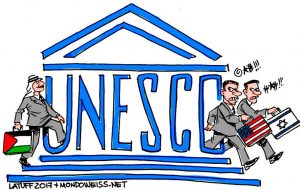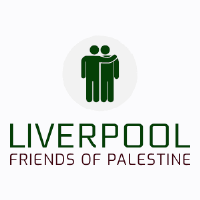GENERAL ASSEMBLY
The General Assembly has presently 193 member states, each having one vote.
On 29 November 2012, the General Assembly voted to accept State of Palestine as a non-member observer state (the Vatican also has that status). This enables the State of Palestine to take part in UN Assembly debates and to join UN Agencies and Conventions. The Palestinian flag also flies outside the UN headquarters in New York.
Recent resolutions of the General Assembly (December 2021), together with some other reports, can be found HERE.
SECURITY COUNCIL
The Security Council has 15 members, each representing a member state. There are five permanent members (China, France, Russia, UK and USA); the other ten are elected for two-year terms.
A resolution requires nine votes in favour to be adopted. Any one of the five permanent members can veto a resolution.
Between 1972 and 2018 the USA vetoed 44 Security Council draft resolutions critical of Israel, which would otherwise have been passed.
On 18 April 2024 a resolution came before the Security Council to admit the State of Palestine to full UN membership. Twelve members voted in favour, the United Kingdom and Switzerland abstained and the United States vetoed it.
UNITED NATIONS AGENCIES
UNHRC – UN Human Rights Council – https://www.ohchr.org
The Council was established by the General Assembly on 15 March 2006 and is based in Geneva. It has 47 members elected on a staggered basis for three-year terms. The council has a ‘special rapporteur on the situation of human rights in the Palestinian territory occupied since 1967′; the role is described HERE. “The task of the Special Rapporteur is to assess the human rights situation in the Occupied Palestinian Territory, report publicly about it, and work with governments, civil society and others to foster international cooperation.” The present rapporteur (in post since March 2022) is Francesca Albanese of Italy. Her first report (full text HERE) concludes that “In short, Israeli endeavours in the occupied Palestinian territory are indistinguishable from settler-colonialism”. Israel has systematically attacked the rapporteur and 108 civil rights organisations have in January 2023 issued THIS STATEMENT in support.
The Council receives regular reports. On 27 May 2021, in THIS RESOLUTION, it set up an ongoing Commission of Inquiry “to investigate in the Occupied Palestinian Territory, including East Jerusalem, and in Israel all alleged violations of international humanitarian law and all alleged violations and abuses of international human rights law leading up to and since 13 April 2021, and all underlying root causes of recurrent tensions, instability and protraction of conflict, including systematic discrimination and repression based on national, ethnic, racial or religious identity;” The inquiry’s first report (14 September 2022) is outspoken by UN standards and concludes “The Commission finds that there are reasonable grounds to conclude that the Israeli occupation of Palestinian territory is now unlawful under international law owing to its permanence and to actions undertaken by Israel to annex parts of the land de facto and de jure.” The full report, that makes a number of recommendations, is HERE. The Commission held public hearings in November 2022 and in December issued critical statements that you can find HERE.
UNOCHA – UN Office for the Co-ordination of Humanitarian Affairs – http://www.unocha.org/
This agency is part of the UN secretariat and was set up in 1998. Its aim worldwide is to co-ordinate response to emergencies. There has been a ‘country office’ for the Occupied Palestinian Territories in East Jerusalem since 2002. Its website address is www.ochaopt.org. It comments that “many Palestinians continue to have humanitarian needs that are created by ongoing violations of international humanitarian and human rights law, including threats to life, liberty and security, restrictions on access and movement of people and goods to and within the OPT, and the risk of forced displacement”. Its publications include a weekly Protection of Civilians report and a monthly Humanitarian Bulletin together with other reports, maps etc.
ECOSOC – UN Economic and Social Council – http://www.un.org/en/ecosoc/
This body was established by the UN Charter of 1946 to advise on economic, social and environmental issues. Its regional arm is the Economic and Social Council for Western Asia (ESCWA), whose annual reports can be found HERE. It sees its role as to monitor and report the costs and impacts of occupation, and prepare the Secretary-General’s annual note on the economic and social repercussions of the Israeli occupation on the living conditions of the Palestinian people in the Occupied Palestinian Territory, including East Jerusalem, and the Arab population in the occupied Syrian Golan.
UNHCR – Office of the UN High Commissioner for Refugees – http://www.unhcr.org/
This agency was set up in 1950 and reports to ECOSOC and the General Assembly. Its involvement in Palestine includes support and advocacy for refugees who are asking the Israeli government for asylum.
UNESCO – UN Educational, Scientific and Cultural Organisation – http://en.unesco.org/
This was created in 1945 on the basis that “Peace must be established on the basis of humanity’s moral and intellectual solidarity”. UNESCO maintains an office in Ramallah and its web address is http://www.unesco.org/new/en/ramallah/home.

On 31 October 2011 the member states of UNESCO voted by 107 votes to 14 to admit Palestine as a member. Within hours the United States cut funding to UNESCO. Palestine became a member formally on 23 November 2011. The first Palestinian World Heritage site is the Church of the Nativity in Bethlehem, designated in June 2012.
Both Israel and the United States finally withdrew from UNESCO at the end of 2018.
UNICEF- UN International Children’s Emergency Fund – http://www.unicef.org/
This is the principal agency for promoting child welfare, created by the UN in December 1946. It publishes data by country and the Palestine profile is HERE.
UNRWA – UN Relief and Works Agency – http://www.unrwa.org/
This agency was set up by General Assembly 302 on 8 December 1949 for the assistance of “persons whose normal place of residence was Palestine during the period 1 June 1946 to 15 May 1948, and who lost both home and means of livelihood as a result of the 1948 conflict.” It provides assistance to more than 5 million Palestinian refugees in Gaza, the West Bank, Lebanon, Syria and Jordan. UNRWA has long suffered from a funding shortfall as its Commissioner General announced in December 2021.Then at the beginning of February 2024, following claims by the Israeli government that twelve UNRWA staff members were involved in the Hamas attack of 7 October 2023, a number of countries, led by the USA, suspended their funding altogether. Some of those countries have since resumed funding (as the Israelis did not provide evidence to back their assertions) but the organisation is still struggling to survive.
UNISPAL – United Nations Information System on the Question of Palestine – https://www.un.org/unispal/data-collection/
This is a developing archive of all UN material on Palestine (resolutions, documents, maps etc). It will in due course be most useful – there are 375 maps listed, for example – but the links do not presently (June 2022) work.
MILITARY AGENCIES
Those who say the United Nations could play a part in stopping the conflicts should know that the United Nations already has a substantial military force in the region.
UNIFIL (UN interim Force In Lebanon) – this was formed in March 1978 to confirm the Israeli withdrawal from Lebanon. At the end of March 2020 it numbered 10,180 troops and around 800 civilians drawn from 45 countries (including Ireland). More information HERE.
UNDOF (UN Disengagement Observer Force) – set up by the Security Council at the end of May 1974, this force is stationed in the ‘Area of Separation’ between Syria and the Golan Heights (also Syrian, but occupied illegally by the Israelis). At the end of May 2019 it had 940 troops and 124 civilians from ten countries (including Ireland). More information HERE.
UNTSO (UN Truce Supervision Organisation) – set up by the Security Council in May 1948 at the time of the Palestinian Nakba, this force had (in 2020) 153 military observers and 244 civilians drawn from 27 countries. It plays an observer role only. It currently provides observer assistance to UNIFIL and UNDOF. More information HERE.
MFO (Multinational Force and Observers) – this is not actually a United Nations body but was set up jointly by Israel and Egypt following the treaty signed between them on 26 March 1979. Its headquarters is in Rome. The force became effective on 25 April 1982, the day that Israel returned the Sinai peninsula to Egyptian sovereignty. It has responsibility for the whole of the Sinai (divided into three zones) and a very small sliver of Israel (along the border). In 2020 it had 1156 military personnel from 13 countries (including the United Kingdom).
INTERNATIONAL LAW
INTERNATIONAL COURT OF JUSTICE
This body was set up by the UN Charter in June 1945. It rules on disputes submitted by member states and issues advisory opinions on matters referred by UN organs and specialised agencies.
On 8 December 2003 the UN General Assembly voted to ask the Court for an advisory opinion on Israel’s Apartheid Wall. It was limited to an advisory opinion as Palestine (not being member state) could not bring a formal case. The court’s opinion, handed down on 9 July 2004, was that the wall and its associated regime is contrary to international law. The opinion and the extensive case papers can be seen HERE. The fact that it is an ‘advisory opinion’ should not lessen its importance.
INTERNATIONAL CRIMINAL COURT
This is not in fact a United Nations body but was set up in July 1998 by the Statute of Rome (which became effective in July 2002). The statute has been adopted by 123 states including Britain and (as of January 2015) the State of Palestine. Israel and the United States are among the states who have not adopted it.
The Palestinians have asked the ICC to investigate those responsible for the attack on the Mavi Marmara in 2010. The Palestinian group Badil has also prepared in February 2016 a dossier (see HERE) relating to Israel’s 2014 attack on Gaza, entitled No Safe Place: Crimes against humanity and war crimes. In December 2019 – there have been delays – the ICC finally concluded that there are reasonable grounds to proceed on these allegations but asked the court to rule on whether it has jurisdiction. That ruling was delivered on 5 February 2021 and found that the court does have jurisdiction over Gaza, the West Bank and East Jerusalem. Further process has begun and THIS is the statement of the Chief Prosecutor on 3 March 2021.
